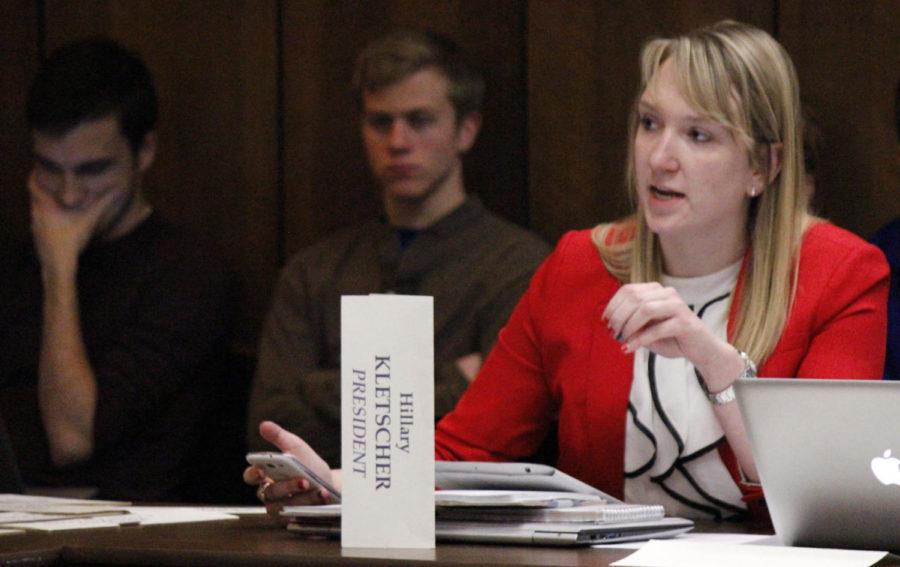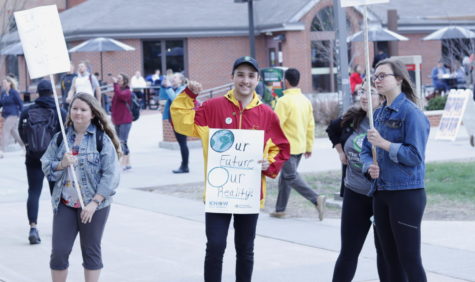GSB fails to provide proposal on tuition for Board of Regents
Caitlin Ellingson/Iowa State Daily
Hillary Kletscher, GSB president and graduate student in business administration, voices her opinions about the possible tuition increases at ISU during a meeting of the Government of the Student Body on Nov. 17 in the Campanile Room of the Memorial Union.
November 18, 2014
The Government of the Student Body’s special senate meeting on Monday night to bring a recommendation to the Board of Regents on a possible tuition freeze was met with gridlock and tabled indefinitely, meaning the bill does not have a scheduled time for a returning discussion.
After GSB voted to approve a resolution to bring a recommendation to the Board of Regents, they reopened debate for another 45 minutes because they felt they had not had an informed debate.
Sen. Khayree Fitten moved to reopen the debate on the bill as a whole after the resolution passed because he said the lack of informed debate from senators was “embarrassing,” calling it “the most poorly written resolution I’ve seen in my time at GSB.”
The resolution that would appear on the BOR docket for the December meeting, when they would talk about another tuition freeze, would not represent students because of the lack of debate and representation, he said.
“Please, I am begging you to ask me questions. I am begging you to talk to your constituents,” GSB President Hillary Kletscher said after agreeing with Fitten.
During the added 45 minutes, senators debated the merits of adding the extra time and whether they had done enough research and work on the topic initially.
Halfway through the resolution, vice-speaker Dan Breitbarth moved to “cut [their] losses” after three senators left, leaving them without full quorum of senators to officially hold a meeting and make decisions.
“The tone of this meeting was horrendous,” Brietbarth said.
But, Breitbarth said he was proud of GSB for coming together to debate the issues as a whole.
The initial resolution stated that GSB believes “if tuition for non-residents would increase, it should not exceed [a] 1.2 percent [increase] in order to allow for financial planning” so students could budget for higher tuition.
The resolution also stated that GSB would ask the board to consider long-term planning be implemented instead of planning for tuition increases or freezes on a year-by-year basis so families can plan.
The last point was that performance-based funding, which would fund regent schools based more on the number of in-state students, should be implemented so “state funding follows Iowans and promotes affordability and accessibility.”
At the beginning of the special senate meeting, GSB debated amendments to the original resolution.
Sen. Hamad Abbas created an amendment to the original bill to change the recommendations to the original document. The amendment was passed.
The amendment said “a continued freezing of tuition is unsustainable in the near future,” because senators said they believe university operating costs will continue to rise. Then, tuition increases will be necessary and will need to be higher than students could possibly afford.
The amendment that was passed before the 45-minute extension also said GSB would support a 1.75 percent tuition increase for resident students and a 1.20 percent tuition increase for nonresident students.
Senators also took issue with the performance-based funding clause.
The regents’ plan to fund the regent universities more based on how many in-state students they have would do nothing but drive a plan to recruit the most in-state students, Sen. Zachary Bauer said. This would increase over-enrollment issues that already exist, he said.
Kletscher said the regents’ reasoning for performance-based funding was that the state gets a lot of funding for education through Iowa taxpayers. When their children enter in-state public universities, they receive the same benefits brought by Iowa taxpayers.
“Fifteen percent of the model pertains to progress and attainment,” said Sen. Evan Abramsky said. “It will bring the model of more students, not the quality of education. It should be called enrollment-based model.”
The clause that recommended performance-based funding was struck down.
Senators then discussed a clause that recommended the board keep tuition increases gradual. Tuition increase is imminent, and Abramsky said just because tuition was frozen for two years doesn’t mean the cost of providing a quality education has frozen.
Kletscher said the university is banking on the possible millions of dollars they will save after the regent universities’ efficiency reviews to keep tuition frozen and still afford a quality education.
The resolution is tabled indefinitely and a recommendation on behalf of the ISU student body will not appear on the December docket for the regents packet that goes out to Iowa elected officials.

















